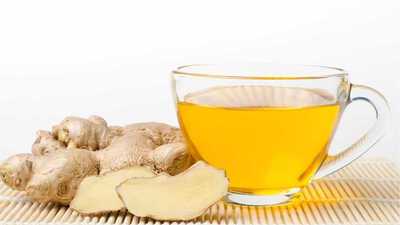Herbal teas are becoming a popular choice for natural wellness, with ginger tea and tulsi tea leading the way. Both have long histories in traditional medicine and are now widely embraced in modern lifestyles. Ginger tea is known for aiding digestion, reducing inflammation, and offering relief from nausea and colds. Tulsi tea, on the other hand, is valued for its stress-relieving, immune-boosting, and detoxifying properties. Each brings its own unique benefits, making them suitable for different health goals. If you're choosing between the two, it depends on whether you need digestive support or overall calm and balance.
Ginger tea and tulsi tea: Comparing the health benefits
Ginger tea
Ginger tea is made by infusing slices of fresh ginger root or ginger powder in hot water. It has a bold, spicy flavour and a warming effect on the body. Ginger is known for its potent anti-inflammatory and digestive properties, making it an excellent remedy for nausea, bloating, and common colds.

Key benefits:
1. Supports digestive health: Ginger tea stimulates digestive enzymes and helps soothe the stomach, making it ideal for relieving indigestion, gas, and nausea. It’s especially helpful after meals or during travel.
2. Reduces inflammation: Ginger contains compounds that help reduce inflammation in the body. This makes it useful for those dealing with joint pain, muscle soreness, or inflammatory conditions.
3. Boosts immunity: Its natural warming effect can help fight off colds and flu, especially during seasonal changes. Ginger tea also helps clear nasal congestion and soothes sore throats.
4. Aids heart health: Regular intake may support healthy circulation and blood pressure management, contributing to improved cardiovascular function.
Tulsi tea
Tulsi tea is prepared using the leaves of the holy basil plant, also known as tulsi. It has a delicate, earthy aroma with slightly peppery notes. Revered in Ayurveda for its adaptogenic qualities, tulsi helps the body cope with stress, supports immune health, and promotes respiratory comfort.

Key benefits:
1. Strengthens immunity: Tulsi is rich in antioxidants and compounds that support the immune system. It may help the body resist infections and promote quicker recovery.
2. Manages stress and anxiety: Tulsi tea has calming properties that help regulate stress hormones. Drinking it regularly can promote mental clarity and a sense of emotional balance.
3. Supports respiratory health: Tulsi helps open airways and ease respiratory discomfort, making it beneficial for people with asthma, allergies, or seasonal congestion.
4. Natural detox support: It is often consumed to help flush out toxins, support liver health, and maintain clear skin from the inside out
Which tea should you choose
Frequently Asked Questions
Q. Can I drink ginger and tulsi tea together?
Yes, you can combine the two for a powerful wellness blend. Together, they may offer combined benefits for digestion, immunity, and stress relief.
Q. Which tea is more effective for boosting immunity?
Both support immune health, but tulsi tea is particularly valued for its antibacterial, antiviral, and anti-inflammatory properties that help strengthen the immune system.
Q. Can I drink ginger tea and tulsi tea daily?
Yes, both can be enjoyed daily in moderation. However, it's best to limit intake to 1–2 cups of each per day to avoid overconsumption of active compounds.
Also read | Dates vs figs: Which is better for effective weight loss and blood sugar control
Ginger tea and tulsi tea: Comparing the health benefits
Ginger tea
Ginger tea is made by infusing slices of fresh ginger root or ginger powder in hot water. It has a bold, spicy flavour and a warming effect on the body. Ginger is known for its potent anti-inflammatory and digestive properties, making it an excellent remedy for nausea, bloating, and common colds.
Key benefits:
1. Supports digestive health: Ginger tea stimulates digestive enzymes and helps soothe the stomach, making it ideal for relieving indigestion, gas, and nausea. It’s especially helpful after meals or during travel.
2. Reduces inflammation: Ginger contains compounds that help reduce inflammation in the body. This makes it useful for those dealing with joint pain, muscle soreness, or inflammatory conditions.
3. Boosts immunity: Its natural warming effect can help fight off colds and flu, especially during seasonal changes. Ginger tea also helps clear nasal congestion and soothes sore throats.
4. Aids heart health: Regular intake may support healthy circulation and blood pressure management, contributing to improved cardiovascular function.
Tulsi tea
Tulsi tea is prepared using the leaves of the holy basil plant, also known as tulsi. It has a delicate, earthy aroma with slightly peppery notes. Revered in Ayurveda for its adaptogenic qualities, tulsi helps the body cope with stress, supports immune health, and promotes respiratory comfort.
Key benefits:
1. Strengthens immunity: Tulsi is rich in antioxidants and compounds that support the immune system. It may help the body resist infections and promote quicker recovery.
2. Manages stress and anxiety: Tulsi tea has calming properties that help regulate stress hormones. Drinking it regularly can promote mental clarity and a sense of emotional balance.
3. Supports respiratory health: Tulsi helps open airways and ease respiratory discomfort, making it beneficial for people with asthma, allergies, or seasonal congestion.
4. Natural detox support: It is often consumed to help flush out toxins, support liver health, and maintain clear skin from the inside out
Which tea should you choose
- Choose Ginger Tea if you’re dealing with bloating, nausea, joint pain, or need a warming boost during colder months.
- Opt for Tulsi Tea if you're under stress, want to support your immune system, or are looking for a calming herbal drink for daily balance.
Frequently Asked Questions
Q. Can I drink ginger and tulsi tea together?
Yes, you can combine the two for a powerful wellness blend. Together, they may offer combined benefits for digestion, immunity, and stress relief.
Q. Which tea is more effective for boosting immunity?
Both support immune health, but tulsi tea is particularly valued for its antibacterial, antiviral, and anti-inflammatory properties that help strengthen the immune system.
Q. Can I drink ginger tea and tulsi tea daily?
Yes, both can be enjoyed daily in moderation. However, it's best to limit intake to 1–2 cups of each per day to avoid overconsumption of active compounds.
Also read | Dates vs figs: Which is better for effective weight loss and blood sugar control
You may also like

'Matter of lives of 3 lakh dogs': What Delhi CM 'attacker' told police; forensic team to examine phone

'Perplexed': What EAM Jaishankar said on Russian oil purchase amid Trump's tariffs; 'India not biggest purchaser'

People spot 'eerie' detail in 1941 photo and claim it's evidence 'time travel exists'

LIC Policy Revival Campaign: Revive Your Lapsed Policy by October 17 With Up to 30% Late Fee Waiver

Vladimir Putin says he is 'READY to meet' Volodymyr Zelensky face-to-face







